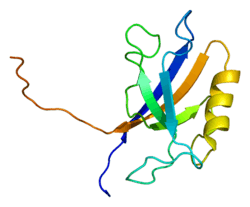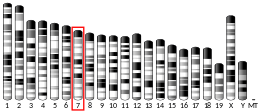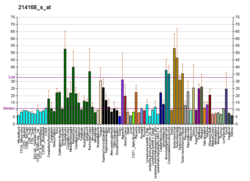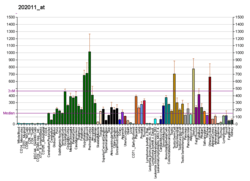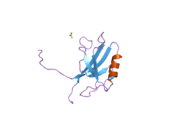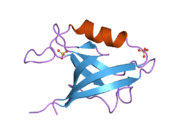Tight junction protein 1
Zonula occludens-1 ZO-1, also known as Tight junction protein-1 is a 220-kD peripheral membrane protein that is encoded by the TJP1 gene in humans.[5] It belongs to the family of zona occludens proteins (ZO-1, ZO-2, and ZO-3), which are tight junction-associated proteins and of which, ZO-1 is the first to be cloned. It was first isolated in 1986 by Stevenson and Goodenough using a monoclonal antibody raised in rodent liver to recognise a 225-kD polypeptide in whole liver homogenates and in tight junction-enriched membrane fractions.[6] It has a role as a scaffold protein which cross-links and anchors Tight Junction (TJ) strand proteins, which are fibril-like structures within the lipid bilayer, to the actin cytoskeleton.[7]
Function
This gene encodes a protein located on a cytoplasmic membrane surface of intercellular tight junctions. The encoded protein may be involved in signal transduction at cell–cell junctions. Two transcript variants encoding distinct isoforms have been identified for this gene.[8]
Interactions
Tight junction protein 1 has been shown to interact with:
See also
References
- ENSG00000104067 GRCh38: Ensembl release 89: ENSG00000277401, ENSG00000104067 - Ensembl, May 2017
- GRCm38: Ensembl release 89: ENSMUSG00000030516 - Ensembl, May 2017
- "Human PubMed Reference:". National Center for Biotechnology Information, U.S. National Library of Medicine.
- "Mouse PubMed Reference:". National Center for Biotechnology Information, U.S. National Library of Medicine.
- Mohandas TK, Chen XN, Rowe LB, Birkenmeier EH, Fanning AS, Anderson JM, Korenberg JR (December 1995). "Localization of the tight junction protein gene TJP1 to human chromosome 15q13, distal to the Prader-Willi/Angelman region, and to mouse chromosome 7". Genomics. 30 (3): 594–7. doi:10.1006/geno.1995.1281. PMID 8825647.
- Stevenson BR, Siliciano JD, Mooseker MS, Goodenough DA (September 1986). "Identification of ZO-1: a high molecular weight polypeptide associated with the tight junction (zonula occludens) in a variety of epithelia". The Journal of Cell Biology. 103 (3): 755–66. doi:10.1083/jcb.103.3.755. PMC 2114282. PMID 3528172.
- Itoh M, Nagafuchi A, Moroi S, Tsukita S (July 1997). "Involvement of ZO-1 in cadherin-based cell adhesion through its direct binding to alpha catenin and actin filaments". The Journal of Cell Biology. 138 (1): 181–92. doi:10.1083/jcb.138.1.181. PMC 2139940. PMID 9214391.
- "Entrez Gene: TJP1 tight junction protein 1 (zona occludens 1)".
- Ebnet K, Schulz CU, Meyer Zu Brickwedde MK, Pendl GG, Vestweber D (Sep 2000). "Junctional adhesion molecule interacts with the PDZ domain-containing proteins AF-6 and ZO-1". The Journal of Biological Chemistry. 275 (36): 27979–88. doi:10.1074/jbc.M002363200. PMID 10856295.
- Ebnet K, Aurrand-Lions M, Kuhn A, Kiefer F, Butz S, Zander K, Meyer zu Brickwedde MK, Suzuki A, Imhof BA, Vestweber D (Oct 2003). "The junctional adhesion molecule (JAM) family members JAM-2 and JAM-3 associate with the cell polarity protein PAR-3: a possible role for JAMs in endothelial cell polarity". Journal of Cell Science. 116 (Pt 19): 3879–91. doi:10.1242/jcs.00704. PMID 12953056.
- Nielsen PA, Baruch A, Shestopalov VI, Giepmans BN, Dunia I, Benedetti EL, Kumar NM (Jun 2003). "Lens connexins alpha3Cx46 and alpha8Cx50 interact with zonula occludens protein-1 (ZO-1)". Molecular Biology of the Cell. 14 (6): 2470–81. doi:10.1091/mbc.E02-10-0637. PMC 194895. PMID 12808044.
- Giepmans BN, Moolenaar WH (1998). "The gap junction protein connexin43 interacts with the second PDZ domain of the zona occludens-1 protein". Current Biology. 8 (16): 931–4. doi:10.1016/S0960-9822(07)00375-2. PMID 9707407.
- Liu G, Kaw B, Kurfis J, Rahmanuddin S, Kanwar YS, Chugh SS (Jul 2003). "Neph1 and nephrin interaction in the slit diaphragm is an important determinant of glomerular permeability". The Journal of Clinical Investigation. 112 (2): 209–21. doi:10.1172/JCI18242. PMC 164293. PMID 12865409.
- Huber TB, Schmidts M, Gerke P, Schermer B, Zahn A, Hartleben B, Sellin L, Walz G, Benzing T (Apr 2003). "The carboxyl terminus of Neph family members binds to the PDZ domain protein zonula occludens-1". The Journal of Biological Chemistry. 278 (15): 13417–21. doi:10.1074/jbc.C200678200. PMID 12578837.
- Yamamoto T, Harada N, Kawano Y, Taya S, Kaibuchi K (May 1999). "In vivo interaction of AF-6 with activated Ras and ZO-1". Biochemical and Biophysical Research Communications. 259 (1): 103–7. doi:10.1006/bbrc.1999.0731. PMID 10334923.
- Fanning AS, Jameson BJ, Jesaitis LA, Anderson JM (Nov 1998). "The tight junction protein ZO-1 establishes a link between the transmembrane protein occludin and the actin cytoskeleton". The Journal of Biological Chemistry. 273 (45): 29745–53. doi:10.1074/jbc.273.45.29745. PMID 9792688.
- Rao RK, Basuroy S, Rao VU, Karnaky Jr KJ, Gupta A (Dec 2002). "Tyrosine phosphorylation and dissociation of occludin-ZO-1 and E-cadherin-beta-catenin complexes from the cytoskeleton by oxidative stress". The Biochemical Journal. 368 (Pt 2): 471–81. doi:10.1042/BJ20011804. PMC 1222996. PMID 12169098.
- Wittchen ES, Haskins J, Stevenson BR (Dec 1999). "Protein interactions at the tight junction. Actin has multiple binding partners, and ZO-1 forms independent complexes with ZO-2 and ZO-3". The Journal of Biological Chemistry. 274 (49): 35179–85. doi:10.1074/jbc.274.49.35179. PMID 10575001.
- Itoh M, Morita K, Tsukita S (Feb 1999). "Characterization of ZO-2 as a MAGUK family member associated with tight as well as adherens junctions with a binding affinity to occludin and alpha catenin". The Journal of Biological Chemistry. 274 (9): 5981–6. doi:10.1074/jbc.274.9.5981. PMID 10026224.
Further reading
- González-Mariscal L, Betanzos A, Avila-Flores A (Aug 2000). "MAGUK proteins: structure and role in the tight junction". Seminars in Cell & Developmental Biology. 11 (4): 315–24. doi:10.1006/scdb.2000.0178. PMID 10966866.
- Anderson NL, Anderson NG (Nov 2002). "The human plasma proteome: history, character, and diagnostic prospects". Molecular & Cellular Proteomics. 1 (11): 845–67. doi:10.1074/mcp.R200007-MCP200. PMID 12488461.
- Zan L, Wu H, Jiang J, Zhao S, Song Y, Teng G, Li H, Jia Y, Zhou M, Zhang X, Qi J, Wang J (Jul 2011). "Temporal profile of Src, SSeCKS, and angiogenic factors after focal cerebral ischemia: correlations with angiogenesis and cerebral edema". Neurochemistry International. 58 (8): 872–9. doi:10.1016/j.neuint.2011.02.014. PMC 3100427. PMID 21334414.
- Zan L, Zhang X, Xi Y, Wu H, Song Y, Teng G, Li H, Qi J, Wang J (Mar 2014). "Src regulates angiogenic factors and vascular permeability after focal cerebral ischemia-reperfusion". Neuroscience. 262: 118–28. doi:10.1016/j.neuroscience.2013.12.060. PMC 3943922. PMID 24412374.
- Willott E, Balda MS, Heintzelman M, Jameson B, Anderson JM (May 1992). "Localization and differential expression of two isoforms of the tight junction protein ZO-1". The American Journal of Physiology. 262 (5 Pt 1): C1119-24. doi:10.1152/ajpcell.1992.262.5.C1119. PMID 1590354.
- Van Itallie CM, Balda MS, Anderson JM (Apr 1995). "Epidermal growth factor induces tyrosine phosphorylation and reorganization of the tight junction protein ZO-1 in A431 cells". Journal of Cell Science. 108 (4): 1735–42. PMID 7542259.
- Balda MS, Anderson JM (Apr 1993). "Two classes of tight junctions are revealed by ZO-1 isoforms". The American Journal of Physiology. 264 (4 Pt 1): C918-24. doi:10.1152/ajpcell.1993.264.4.C918. PMID 7682777.
- Furuse M, Itoh M, Hirase T, Nagafuchi A, Yonemura S, Tsukita S, Tsukita S (Dec 1994). "Direct association of occludin with ZO-1 and its possible involvement in the localization of occludin at tight junctions". The Journal of Cell Biology. 127 (6 Pt 1): 1617–26. doi:10.1083/jcb.127.6.1617. PMC 2120300. PMID 7798316.
- Willott E, Balda MS, Fanning AS, Jameson B, Van Itallie C, Anderson JM (Aug 1993). "The tight junction protein ZO-1 is homologous to the Drosophila discs-large tumor suppressor protein of septate junctions". Proceedings of the National Academy of Sciences of the United States of America. 90 (16): 7834–8. doi:10.1073/pnas.90.16.7834. PMC 47237. PMID 8395056.
- Itoh M, Nagafuchi A, Yonemura S, Kitani-Yasuda T, Tsukita S, Tsukita S (May 1993). "The 220-kD protein colocalizing with cadherins in non-epithelial cells is identical to ZO-1, a tight junction-associated protein in epithelial cells: cDNA cloning and immunoelectron microscopy". The Journal of Cell Biology. 121 (3): 491–502. doi:10.1083/jcb.121.3.491. PMC 2119563. PMID 8486731.
- Andersson B, Wentland MA, Ricafrente JY, Liu W, Gibbs RA (Apr 1996). "A "double adaptor" method for improved shotgun library construction". Analytical Biochemistry. 236 (1): 107–13. doi:10.1006/abio.1996.0138. PMID 8619474.
- Yu W, Andersson B, Worley KC, Muzny DM, Ding Y, Liu W, Ricafrente JY, Wentland MA, Lennon G, Gibbs RA (Apr 1997). "Large-scale concatenation cDNA sequencing". Genome Research. 7 (4): 353–8. doi:10.1101/gr.7.4.353. PMC 139146. PMID 9110174.
- Itoh M, Nagafuchi A, Moroi S, Tsukita S (Jul 1997). "Involvement of ZO-1 in cadherin-based cell adhesion through its direct binding to alpha catenin and actin filaments". The Journal of Cell Biology. 138 (1): 181–92. doi:10.1083/jcb.138.1.181. PMC 2139940. PMID 9214391.
- Haskins J, Gu L, Wittchen ES, Hibbard J, Stevenson BR (Apr 1998). "ZO-3, a novel member of the MAGUK protein family found at the tight junction, interacts with ZO-1 and occludin". The Journal of Cell Biology. 141 (1): 199–208. doi:10.1083/jcb.141.1.199. PMC 2132714. PMID 9531559.
- Moroi S, Saitou M, Fujimoto K, Sakakibara A, Furuse M, Yoshida O, Tsukita S (Jun 1998). "Occludin is concentrated at tight junctions of mouse/rat but not human/guinea pig Sertoli cells in testes" (PDF). The American Journal of Physiology. 274 (6 Pt 1): C1708-17. doi:10.1152/ajpcell.1998.274.6.C1708. hdl:2433/180874. PMID 9611137.
- Giepmans BN, Moolenaar WH (1998). "The gap junction protein connexin43 interacts with the second PDZ domain of the zona occludens-1 protein". Current Biology. 8 (16): 931–4. doi:10.1016/S0960-9822(07)00375-2. PMID 9707407.
- Katsube T, Takahisa M, Ueda R, Hashimoto N, Kobayashi M, Togashi S (Nov 1998). "Cortactin associates with the cell-cell junction protein ZO-1 in both Drosophila and mouse". The Journal of Biological Chemistry. 273 (45): 29672–7. doi:10.1074/jbc.273.45.29672. PMID 9792678.
- Fanning AS, Jameson BJ, Jesaitis LA, Anderson JM (Nov 1998). "The tight junction protein ZO-1 establishes a link between the transmembrane protein occludin and the actin cytoskeleton". The Journal of Biological Chemistry. 273 (45): 29745–53. doi:10.1074/jbc.273.45.29745. PMID 9792688.
- Itoh M, Morita K, Tsukita S (Feb 1999). "Characterization of ZO-2 as a MAGUK family member associated with tight as well as adherens junctions with a binding affinity to occludin and alpha catenin". The Journal of Biological Chemistry. 274 (9): 5981–6. doi:10.1074/jbc.274.9.5981. PMID 10026224.
- Yamamoto T, Harada N, Kawano Y, Taya S, Kaibuchi K (May 1999). "In vivo interaction of AF-6 with activated Ras and ZO-1". Biochemical and Biophysical Research Communications. 259 (1): 103–7. doi:10.1006/bbrc.1999.0731. PMID 10334923.
- Wittchen ES, Haskins J, Stevenson BR (Dec 1999). "Protein interactions at the tight junction. Actin has multiple binding partners, and ZO-1 forms independent complexes with ZO-2 and ZO-3". The Journal of Biological Chemistry. 274 (49): 35179–85. doi:10.1074/jbc.274.49.35179. PMID 10575001.
- Cario E, Gerken G, Podolsky DK (July 2004). "Toll-like receptor 2 enhances ZO-1-associated intestinal epithelial barrier integrity via protein kinase C". Gastroenterology. 127 (1): 224–38. doi:10.1053/j.gastro.2004.04.015. PMID 15236188.
